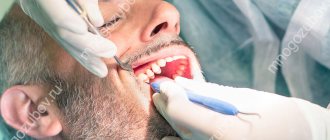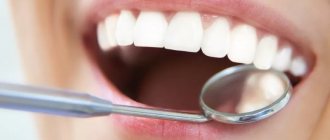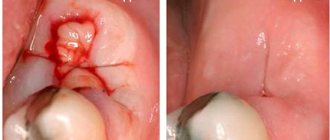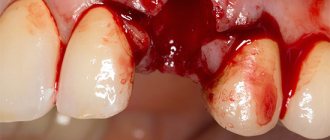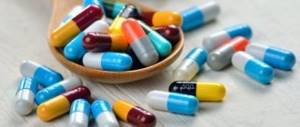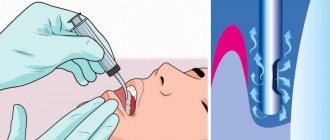Home / Periodontal disease
Back
Published: 06/03/2020
Reading time: 6 min
0
8
- 1 Important rules when treating with antibiotics
- 2 Types of oral diseases
- 3 Classification
- 4 Treatment of tooth inflammation with antibiotics
- 5 Lincomycin
- 6 Consequences of installing implants
- 7 Reasons for the development of inflammatory processes
- 8 What are the dangers of injecting an anti-inflammatory drug into the gums?
Indications for the use of antibiotics in dentistry
The need for treatment with antibiotics depends on the nature of the infection and the body's ability to withstand the course. The main reasons for prescribing antibiotics include:
- When advanced caries threatens pulpitis, the dentist may prescribe antibiotics to limit the spread of the pathological process. The patient is prescribed antihistamines to complement the effectiveness of antibiotics.
- With the development of an inflammatory process of periodontal tissue (periodontitis), antibiotic therapy allows the destruction of protozoa, gram-negative anaerobes in the oral cavity. Various dosage forms of drugs are used for treatment: gels, ointments, intramuscular and intravenous injections, tablets.
- The proliferation of pathogens, poor immunity, caries and dense plaque can lead to the development of gingivitis. After laboratory detection of the sensitivity of microbes to the antibiotic, a course of treatment is prescribed. Antibiotic drugs are mainly used for catarrhal gingivitis.
- The appearance of purulent accumulations inside the oral mucosa provokes the appearance of a fistula. The process occurs due to the proliferation of anaerobic gram-negative bacteria, streptococci, staphylococci, Pseudomonas aeruginosa or Escherichia coli. A doctor-prescribed course of antibiotics, which are also used for dental implantation, will help cope with the infection.
- Inflammation of the connective tissue around the root of the tooth is called periodontitis. The occurrence of the disease is a consequence of dental trauma, a complication of pulpitis, caries, or an error in dental treatment. If the process is not stopped, pus may appear. The effectiveness of antibiotics for periodontal disease is felt after preliminary cleaning of the periodontal tissue.
- The result of inflammation of various origins can be a granuloma - a cavity of granulation tissue filled with fluid. Location: on the gum near the root of the tooth. It is important to start treating granuloma in the early stages. The use of antibiotics facilitates the opening of the granulosa vesicle and suppresses the infection accumulated in it, and serves to prevent infection. Self-medication with antibacterial drugs is unacceptable.
Negative influences
When attempting self-treatment, violating the recommended dosages and incorrect duration of therapy, taking the drug may be complicated by adverse reactions from the body. The main negative manifestations include:
- decreased appetite;
- suppression of intestinal microflora;
- allergic reactions;
- night sleep disorders - insomnia and pathological sleepiness during the daytime;
- persistent skin itching;
- periodic dizziness;
- hives;
- painful sensations in the epigastric region;
- dyspeptic disorders – diarrhea;
- nausea leading to vomiting;
- erythematous rash;
- liver dysfunction;
- convulsive conditions;
- conjunctivitis;
- changes in clarity of consciousness;
- pain in the joint area.
If the recommended dosages are accidentally or intentionally exceeded, the following symptomatic manifestations may occur:
- anaphylactic shock;
- anorexia;
- vasculitis of allergic etiology;
- hemolytic anemia;
- hepatitis;
- depressive states;
- dysbacteriosis - a violation of microflora in the intestinal tract;
- candidiasis;
- feverish conditions;
- Quincke's edema;
- peripheral neuropathy;
- redness of the skin;
- breathing problems;
- rhinitis;
- stomatitis – inflammatory processes on the mucous membranes of the oral cavity;
- accelerated rhythm of contractions of the heart muscle - tachycardia;
- cholestatic jaundice;
- eosinophilia – an increased number of eosinophils, determined by laboratory diagnostics.
The first negative manifestations require immediate cessation of therapy and contacting a treating specialist.
Types of antibiotics for toothache
Doctors use antibiotics in dentistry, which have a wide range of applications, to stop the growth and reproduction of mixed bacterial infections in the oral cavity. Drugs are divided into the following types:
Should I take an antibiotic for dental inflammation?
What to do if the gums become inflamed after the removal of a wisdom tooth, due to trauma, or with advanced caries? How to treat a complicated form of periostitis and periodontitis? The effectiveness of therapy largely depends on the selection of the optimal type of antibacterial drug to suppress the pathological process. It is useful to know when an antibiotic is prescribed for dental inflammation, which groups of drugs are most often used in dental practice.
Prevention methods
To prevent this unpleasant situation, you must follow simple rules:
- Regular and thorough brushing of teeth. It is recommended to do this hygiene procedure twice a day (in the morning and before bed).
- Avoid heavy chewing loads. To do this, you should give up frequent consumption of solid foods (nuts, seeds, etc.).
- Visit the dentist every six months. There is no need to wait for black spots and other symptoms of dental disease to appear. It is required to make an appointment even without any complaints, as this will help identify and eliminate the problem in the early stages of development.
Now you know how to make yourself feel better when a tooth hurts under the crown, what to do in this situation, and also you will not make mistakes that could aggravate your current health condition.
How to use an antibiotic for tooth inflammation with pus
At the first stage, while the pathological process is less active, rinses with an antibacterial effect are carried out as prescribed by the dentist.
Local medications act directly on the affected area and are less absorbed into the systemic circulation, which reduces the risk of side effects.
You need to crush the tablets of Lincomycin, Azithromycin or Tetracycline, combine them with lukewarm (not hot) boiled water, and rinse your mouth with the solution. The proportions of the components are selected by the dentist.
Active inflammatory process in the periosteum and gums after removal of the problem unit, with infection from the outside or hematogenously, flux is an indication for the prescription of antimicrobial compounds. It is important to prevent complications that develop when purulent masses accumulate or exudate exits into the oral cavity through the fistula. With the flow of blood and lymph, infectious agents penetrate into other parts of the body.
Periodontitis and periostitis in acute or chronic form are dangerous diseases. To heal the wound, the dental surgeon first cleans the affected area, removes a thick mass containing pathogens, particles of blood and mucus. The second stage is the prescription of antibacterial drugs. For purulent inflammation, penicillins show high effectiveness: Amoxicillin, Amoxiclav. Depending on the severity of the pathological process, antibiotics are taken orally or given injections.
If an odontogenic infection is detected, against which the gums fester, the use of the drugs Gentamicin, Grammidin C, Ciprofloxacin, Cifran is indicated.
Names of antibiotics used for inflammation of the dental nerve and root
The dentist prescribes medications to suppress infection based on the results of an examination of the problem area. When the nerve is inflamed, it is difficult to eat and drink; throbbing or aching pain accompanies a person throughout the day and intensifies at night.
Before starting therapy, the doctor conducts an allergy test and interviews the patient to identify contraindications.
Antibiotics help eliminate inflammation of the root and dental nerve:
- Ciprofloxacin.
- Azithromycin.
- Amoxiclav.
- Azithromycin.
- Ampiox.
- Doxycycline.
- Digital
List of effective antibacterial agents for dental infections under the crown
After endoprosthetics and implant installation, some patients complain of discomfort. Pain and inflammation are a consequence of a violation of the technology for fixing artificial teeth and crowns: the dentist did not completely fill the cavity inside the problem unit or mechanical damage to the canal walls occurred. If the implantologist is poorly qualified, the pin may be installed incorrectly. Perhaps the smallest parts from dental instruments remain inside the canal.
There are several causes of the pathological process and pain syndrome:
- swollen gums or gumboil (acute inflammation);
- cyst - a cavity with fluid near the root of a problematic unit of the dentition;
- inflammation of the submandibular salivary glands;
- dental granuloma;
- a fistula on the gum is a hole through which purulent masses are released.
With the development of inflammation in periodontal tissues, an abscess forms at the root apex. Painful sensations are a consequence of the active accumulation of exudate and pressure on neighboring areas.
The main condition for eliminating discomfort is a timely visit to the dentist to remove the crown, clean the root canals, and eliminate the cause of the inflammatory process. Uncontrolled use of antibiotics can harm the body.
Before treating the canals, the doctor makes an injection into the gum, removes the prosthesis, and examines the affected area.
Effective antibiotics are prescribed to suppress the infection:
After the removal of a wisdom tooth, there is an increased risk of not only inflammation, but also bleeding from the socket.
If the patient takes the drug Warfarin to prevent thrombosis, then you need to warn the dentist: the doctor temporarily stops taking the medication for several days before and after the extraction of the “eight”, be sure to coordinate this action with the cardiologist.
It is important to know how to combine an antithrombotic agent with antimicrobial compounds.
The use of antibiotic therapy during pregnancy and lactation
Most antimicrobial agents are prohibited for use by expectant mothers and during breastfeeding. When prescribing antibiotics to suppress the purulent-inflammatory process in the gums and periosteum, the doctor takes into account the benefits for the woman and the possible risk for the developing fetus.
With the active spread of infection, suppuration, development of sepsis, severe complications against the background of the pathological process, it is possible to take certain groups of antibacterial agents. The new generation of antibiotics is less toxic to the fetus.
Under strict medical supervision, in the minimum effective dose, the following is prescribed:
- Ornidazole;
- Metronidazole;
- Josamycin;
- Azithromycin;
- Clarithromycin;
- Clindamycin;
- Cefepime;
- Ceftaroline.
The list of approved drugs is indicated by the dentist. The best option is to additionally consult with a gynecologist managing the pregnancy.
Anti-tuberculosis antibiotics are allowed to be used by pregnant women in combination with other drugs according to a specific regimen for a long period.
Contraindications to treatment with antibacterial drugs
Compositions for suppressing the inflammatory process in gingival and bone tissue during toothache are not suitable for all patients. Restrictions for use are related to age, body reactions, and special conditions. Most antibacterial drugs should not be used by nursing mothers or pregnant women.
Main contraindications for antibiotic therapy:
- allergic reactions;
- liver and kidney failure;
- intolerance to the active substance: you need to choose a substitute with another active ingredient;
- myasthenia gravis;
- damage to the optic nerve;
- severe diseases of the gastrointestinal tract;
- the patient is taking medications that are incompatible with a certain group of antibiotics;
- tendinitis;
- epilepsy;
- children's age (restrictions are indicated in the instructions for the drug).
A limited range of antibacterial compounds are used in pediatric practice.
It is important to clarify in the instructions the age of the child for safe antibiotic therapy for acute inflammation of tissues in the oral cavity.
In case of purulent inflammation, the development of periostitis and periodontitis, when the gums are swollen, the dentist selects effective antibacterial compounds. Many inexpensive antibiotics work well for dental inflammation and quickly suppress the pathological process. New generation drugs with a minimal list of contraindications and side effects are safer.
Antibiotics for toothache.
Many people consider antibiotics a panacea for all ills and, at the first problem with their teeth, begin to take them intensively. However, such self-medication can cause irreparable harm to other organs and systems of the body, without improving the condition of the teeth. Prescribing antibiotics is the exclusive prerogative of the doctor. In what cases are these medications prescribed?
Prohibitions on use
Amoxicillin is contraindicated for use in case of existing pathologies and diseases:
- lymphocytic leukemia;
- infectious mononucleosis;
- allergic diathesis;
- respiratory viral infections;
- bronchial asthma;
- spontaneous allergic reactions to antibiotics;
- infectious diseases of the gastrointestinal tract - with complications in the form of diarrhea;
- impaired functionality of hematopoiesis;
- insufficient kidney function;
- hay fever;
- colitis;
- bleeding noted in the anamnestic data;
- diseases of the nervous system;
- when using estrogen-containing contraceptives.
Any of the above contraindications are the reason for the use of other drugs of the antibiotic subgroup.
Are antibiotics effective?
Before starting a course of antibiotics, you should determine the cause of your toothache. There are two main factors that provoke it:
- Caries that has developed to pulpitis. When the carious process affects the nerve, the tooth begins to react to various irritants: sour, sweet, cold, hot. Since in this case the pain is provoked by an intradental inflammatory process, antibiotics will be completely useless. For such pain, anti-inflammatory drugs, for example, Ibuprofen, are relevant. In addition to drug treatment, it is also planned to remove the affected tissue and fill the dental canals.
- An infection localized in a “dead” tooth. In such a situation, after removal of the nerve, the tooth does not react to sour, sweet and other irritants, but at the same time it hurts - and more and more every day. It's all about microbes that multiply either in an unfilled canal or in some tiny crack in the root. As a result, a purulent abscess or gumboil develops near the root of the tooth. The latter, by the way, is deadly. If such inflammation of the tooth root occurs, antibiotics are prescribed, but before taking them the patient will have to undergo the procedure of opening the abscess.
Before pinning any hopes on antibiotics, you should understand a few facts about this group of drugs:
- antibiotics help in treating the disease that provokes toothache, and do not relieve the pain itself (there are analgesics for this purpose);
- different antibiotics have different effects on pathogens, so it is almost impossible to successfully select such a medicine on your own;
- the effectiveness of taking antibiotics without concomitant dental treatment tends to zero.
The course of antibiotic treatment should not be interrupted prematurely: incomplete therapy will not lead to the desired result.
Causes
The reasons for the development of pathology may be the following:
- Tooth injury, mechanical or chemical. Violation of the integrity of enamel and dentin makes the pulp extremely vulnerable to the effects of the external environment and pathogenic bacteria.
- Gum diseases. In this case, there is a high risk of infection entering through open periodontal pockets.
- Complications of caries. Uncured caries or its advanced form contribute to the entry of pathogenic microorganisms - streptococci - into the pulp through the dentin tubules.
- Incorrectly performed dental treatment - damage to dental tissue, opening of a tooth performed in violation of technique, burn of dental tissue by arsenic, etc.
- Incomplete removal of carious tissue during treatment. The infection persists in the dental cavity and continues to develop.
- Poor quality filling installation. It is dangerous because there is a gap between the tooth wall and the filling material. Through it, pathogenic microorganisms penetrate into the pulp.
